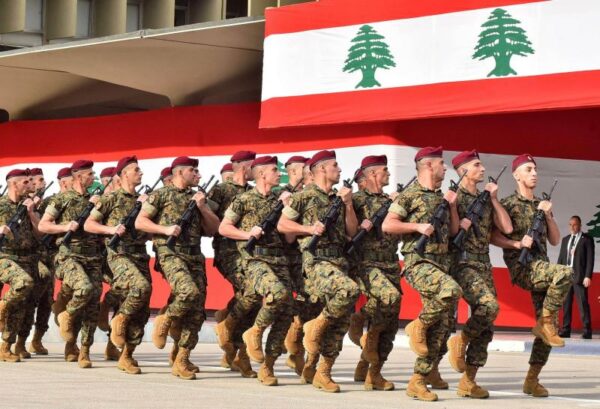By Ya Libnan Editorial Board
File photo shows Lebanese army soldiers marching during a military parade commemorating the 76th anniversary of Lebanese independence from France at the Defence Ministry headquarters in Yarze. (AFP)
Iran appears to have abandoned Hezbollah way before its leader Sayed Hassan Nasrallah was assassinated. This article brings up a critical and thought-provoking perspective on the evolving dynamics within Lebanon’s Shiite community. The potential loosening of Iran’s influence over Hezbollah could indeed be a turning point, leading to a reevaluation of loyalties and priorities among Lebanese Shiites. By shifting focus inward and embracing their national identity over sectarian allegiances, the Shiite community could play a pivotal role in breaking the deadlock and helping the country move forward.
The suggestion that Lebanon’s Shiites could invest in internal stability, rather than Hezbollah’s external alliances, raises the hope of a more inclusive political dialogue. If they are willing to step away from hardline politics, it could foster the conditions necessary for a more unified approach to resolving Lebanon’s crises, especially the long-standing issue of electing a president.
This scenario not only has the potential to transform Lebanon’s political landscape but could also resonate across the region, signaling a shift towards local governance and away from foreign influence, which has long shaped Lebanon’s history.
Incorporating the notion that Hezbollah’s next leader should transfer its arms and fighters to the Lebanese army offers a pragmatic approach to Lebanon’s internal and external security issues. While Hezbollah has long justified its military presence by claiming to fight for the liberation of Palestine, the reality is that it has not achieved tangible results on that front.
By integrating with the Lebanese army, Hezbollah could preserve its legacy without admitting defeat, while contributing to national unity and reinforcing the country’s defense capabilities. Such a move could empower the army to better protect Lebanon’s borders, establish law and order, and reduce the risk of internal divisions. This approach might also strengthen Lebanon’s sovereignty, positioning the country to focus on internal stability, rather than being entangled in regional conflicts.
This transition could mark a historic step toward demilitarizing non-state actors, consolidating power under legitimate state institutions, and creating a more cohesive national identity that prioritizes Lebanon’s interests over external agendas.
The next logical step for Hezbollah, following its potential integration into the Lebanese army, would be to collaborate with other political parties to elect a president, ending the prolonged power vacuum. Lebanon’s two-year absence of a president has exacerbated its political and economic crises, and Hezbollah’s role in this deadlock has contributed to national instability.
By working alongside other factions in a constructive dialogue, Hezbollah could shift from being perceived as a divisive force to becoming part of a solution. A united effort to elect a president would not only restore the functionality of Lebanon’s political system but also signal a renewed commitment to governance and national unity. Such cooperation could pave the way for addressing the broader economic and social challenges facing Lebanon, moving the country toward recovery and stability.
The third crucial step in Lebanon’s journey toward stability is the dismantling of political sectarianism, a system that has long entrenched divisions within the country. Implementing the full terms of the Taif Accord, which aimed to bring an end to the civil war and promote national unity, is essential to achieve this goal. The Accord calls for a fairer distribution of political power and the eventual abolition of sectarian quotas in government.
For Hezbollah and other political parties, embracing this change would mark a commitment to a more inclusive and unified Lebanon, where merit and national interests take precedence over sectarian affiliations. This could lay the foundation for a stronger, more democratic Lebanon, capable of overcoming its internal divisions and addressing the pressing needs of its people. Ending political sectarianism would also help Lebanon gain greater political independence, distancing the country from external influences that have often exacerbated its internal conflicts.


Leave a Reply
You must be logged in to post a comment.